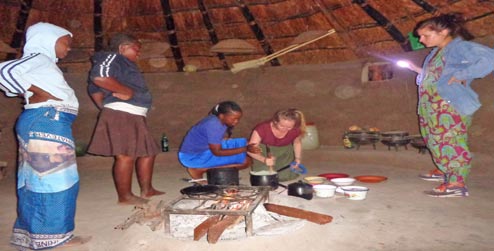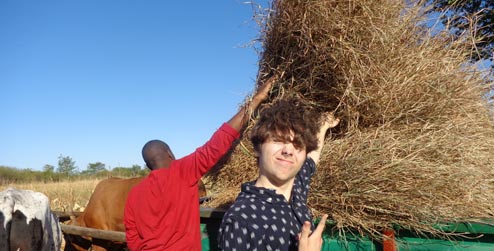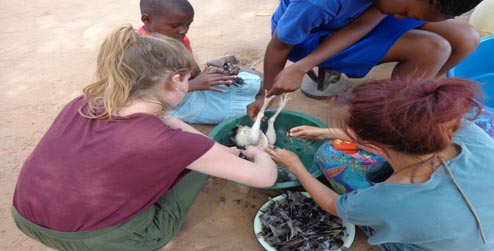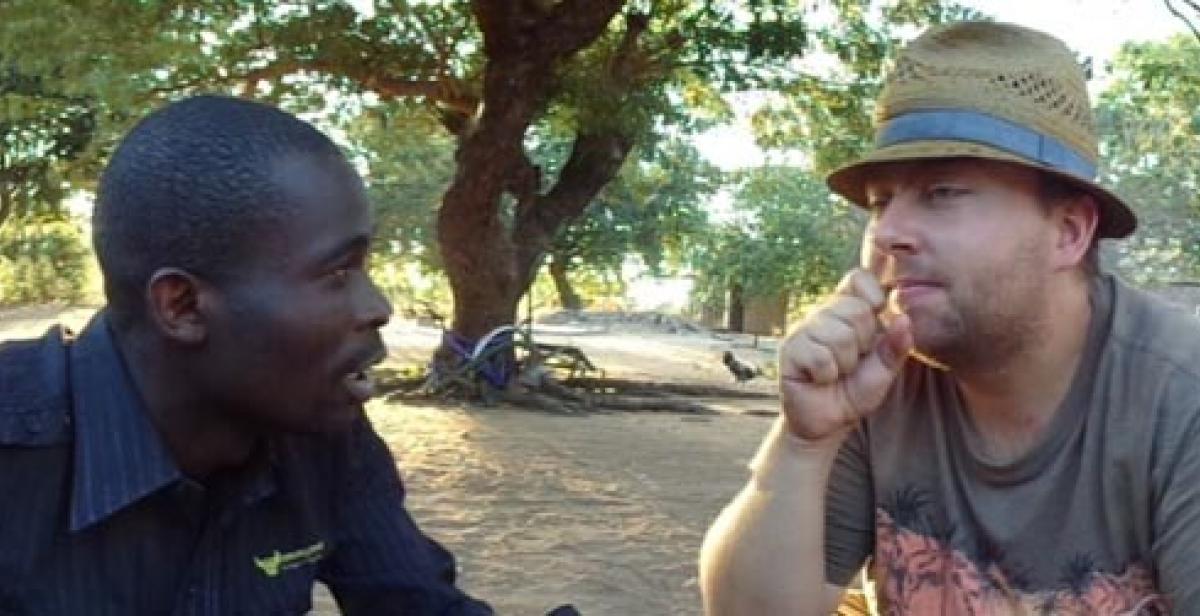Appearing as if by magic from the cloud of dust that enthralled us, we pulled up in Mr and Mrs Siansali’s yard just as the sun was bobbing gently below the trees. We were met with frantic waves and toothy smiles by the cheery couple, who were quickly joined by their daughter Valencia to greet us. After generous introductions from all we were given a brief tour of the family home by Mr Siansali. It was a spacious enclosure, dotted with thatched huts made entirely from wood, mud and straw. The toilet was situated in the far corner, a stone’s throw away from the sleeping quarters, which being concrete looked slightly out of place in this quaint setting. Chickens and dogs roamed together harmoniously, and as the sun finally set a sense of serenity consumed the yard.
Our first Tonga cooking experience
Heaving a hefty pumpkin towards the kitchen, Linda, Bu, Emily and I got set to our first cooking task of the weekend. As my nostrils filled with the thick heavy scent of smoke and my eyes adjusted I became acquainted to the traditional Tonga kitchen. The fire taking centre stage dominated the room, which was round and dark but for the sunlight seeping through the cracks in the wall. We threw the pumpkin into the boiling pan and went to join the boys outside.

In traditional Tonga form the boys were given stools to sit on whilst the girls were given mats made out of what looked like bamboo sticks. Parking my behind on the floor, I glanced over to the boys who, given their facial expressions looked like they may have preferred the non-seated option in this case. I suddenly became very attached to my mat. Before I could get too emotionally involved in the seating arrangements however, it was time to serve up the pumpkin, to the men first of course. With a slight touch of resentment Emily knelt down to wash their hands, whilst I continued to serve them the food. We took the remainder back to our patch, and hungrily guzzled it down.
After all had been devoured, we (as in the girls) gathered the used pots and pans and took them up to the washing station situated at the rear of the yard. Using sand and soap (yes the ultimate combo!), we scrubbed them spotless whilst the dogs hovered expectantly next to our feet. I felt a pang of sorrow for these poor wee mutts, who were all but skin and bone compared to the porky hound that awaited me at home. I later learned that these dogs survive on leftovers alone-so basically sadza! With all the pots sparkling, it was time to re-dirty them in preparation for dinner. On the menu tonight was sadza and okra. Not my first choice, but in this scenario I don’t think choice was really an option, so we (as in the girls!) set to work, whilst the boys enjoyed their time to talk about manly matters of the world, ahem!It being the first time I’ve eaten okra, there are several words that come to mind when describing it. I don’t want to use the word ‘slime’, but unfortunately I think it is the most appropriate term. Slime not relaying a very positive message, I will simply say ‘it is an acquired taste/texture’, one I’m sure that if you were to spend long enough in Zimbabwe you would learn to love.
Sleeping in the pantry
After a few shared ghost stories in the kitchen, we dispersed as a group into our sleeping arrangements. Emily and I had opted for the pantry, as sharing a small double bed with 5 others had become less and less appealing. We laid cushions down on the floor and made ourselves what I would call a relatively comfy bed given the circumstances. Had it not been for the dried fish hanging precariously above Emily’s head, I might have even called it luxury! Lights went out, ear plugs went in and apart from the odd disturbance from Aaron’s animalistic snoring next door, we were out for the night.
Early wake up call

We were awoken at 6am sharp the next day to prepare breakfast (a variation on sadza except with a more porridge like consistency.) Valencia helped us construct a fire, and within an hour we had conjured up a delicious banquet for all. As a plan B, we had also assembled a huge batch of peanut butter sandwiches to be indulged, which were ravenously consumed within minutes once the boys had returned. They had been up at the crack of dawn, gathering grass from the fields in preparation for thatching. After breakfast we took a stroll to meet the local chief of police, a standard protocol in Zimbabwe when visiting or carrying out any work in a new place. As usual we were greeted with welcomed gratitude, and a brief lesson in basic Tonga.
Before our visit to see the Chief of Kariyangwe, we were informed that we would need to kill a chicken in order to avoid eating okra again. Emily quickly volunteered, and I was very grateful for this act of martyrdom on her part. Being the hypocrite that I am I could eat a chicken, but not kill one. The chicken gave us a good chase around the yard, but to no avail. It was caught and straddled by various members of the Siansali family, whilst Emily hastily edged towards it with a knife. Unfortunately however, when it came to the crunch Emily, like I, crumbled and Mrs Siansali had to finish the deed. Emily and I exchanged glances as if to say, we’re not doing very well here are we?! Nonetheless, we got on with the plucking of the chicken no questions asked, before we thrust it into a pot, ready to be dismembered and de-gutted by Mrs Siansali.

Meeting the Chief
With a few minutes to wash the blood off our hands, we hit the road to go and meet the chief. This would be our second meeting with Chief Siansali. Our first one had been during the cultural rehearsals a few weeks prior, when he had given Aaron, Ned, Emily and I official Tonga names. Mine was N’Simbi, Ned was Dimbe, Aaron Siansali and Emily, Bambi. Ned had conducted a variety of questions to ask the chief, which we filmed as an official interview. The chief himself was fairly young, in his mid 30s and answered our questions with an air of humour, ensuring we felt at ease throughout. I don’t know what I expected but he wasn’t how I’d stereotyped a Chief to be at all. He was still very persistent on preserving Tonga traditions, yet he was also avidly conscious of modern day concerns, especially regarding HIV and other STIs. He made it clear that most of the out dated Tonga traditions, which might increase risk of such diseases are no longer in place in the community, and haven’t been for a long time.
We arrived back home to find the chicken already sizzling in the pot, all that was left to prepare for tonight’s supper was the customary sadza. Something that Emily and I were now pros at, with the help of Linda, Bu and Valencia of course. Dusk was nigh when we were given the unfortunate news that water supplies were low and we would need to go and collect some before food. I was prepared to carry water on my head, but I wasn’t so committed to doing it in the dark. Nonetheless, what must be done must be done, so we set off into the night…in single file, watching out for the snakes!
Fetching water
We arrived at the water pump around 20 minutes later, in the process we’d seen another stunning sunset, but had traversed cross country in order to get there. I’d tripped over numerous times on the way, so it was a guarantee that history would repeat itself on the way home, with a 15L bucket of water on my head.
We pumped the water into about 20 different buckets for what seemed like an hour, before the dreaded task of carrying the stuff fulfilled itself. Old ladies the size of my thumb hauled 20 L pales of water onto the top of their head. Their heads looked like they were about to invert on themselves from the weight, yet they did it so effortlessly. I felt pathetic as I struggled to put a 10 L bucket on mine.
The walk back was somewhat of a nightmare, which was only increased when what felt like rusty nails bored into my feet continuously. I later found out these things were just thistles. It turns out when you have a weight like that on your head, every other pain is severely accentuated. Everyone else however (bar Emily) seemed to think the walk was a breeze, nothing more than a quick stroll in the park. I envied both their physical and mental strength-I really needed to toughen up!
The only silver lining to this scenario was that the boys didn’t get off completely scot free. They had to carry the heaviest containers on their shoulders which from the moans and groans that echoed from far behind me, made just for one second my pale of water seem a little lighter. This didn’t last long however.

Meeting the Youth
For our final day in Kariyangwe we had set aside the task of meeting the Youth at the high school. The purpose of this visit was to follow up on the HIV workshop the previous ICS group had carried out with them on their cultural exchange. We also wished to further their knowledge by presenting them with a workshop on STIs and contraception. We had to wait a while for the participants to show, but once they had arrived we gave them a questionnaire based on what they had learnt last time. We then carried out the workshop, which regardless of the sniggers from the group seemed to make a positive impact on them. As the workshop drew to a close, we got ready to head back to the Siansali’s home to say our goodbyes. Our ride was waiting for us when we returned, so with a quick dash around the yard to gather our belongings we hopped in the back of the 4X4 ready for the long old trip to Binga.
As a whole, we had really enjoyed our weekend in Kariyangwe. Living in a traditional home had been an invaluable experience to understanding the Tonga culture and ways of life, particularly for a woman. Not only had Mrs Siansali and her daughter been so accommodating and helpful throughout our stay, but their sense of character and strength had been a pivotal aspect of keeping us motivated.
Blog by Kitty Moorsom



